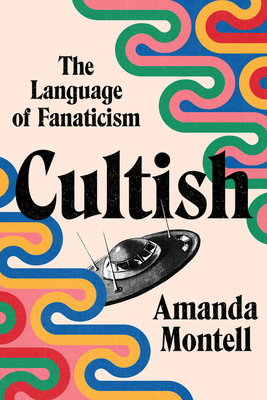- The Good: Storytelling about cults
- The Bad: Surface-level linguistics and psychological explanations; more colloquial than data-driven
- The Literary: Some great specific examples of culty linguistics, especially in Scientiology
Cults fascinate us because seemingly normal people fall prey to them, losing their money and often their sense of self. Many explain the phenomenon with the idea that that cult leaders brainwash their adherents. Why else would people drink the Kool-Aid? But in Cultish Amanda Montell argues that language is the key factor behind the influence of cults and why they are so powerful.
I really like the approach of delving deep into the social science of why cults sway so many of us, so I’m happy the concept of brainwashing is dismissed so early in the book. I also like that Montell defines cults quite broadly, with a range of “culty” and “cultish” attributes, of which some organizations have a bunch and others only some. It’s the use of non-standard language, “the technical terms, the redefined words, the shorthand, the clichés, the euphemisms, logical distortions”, etc, that coerce and manipulate members of these organizations.
Speaking of language, the prose in this book is quite informal, which makes for an easy introduction into cults or modern religions. The colloquial style mimics a casual conversation among friends, including occasional forays into the author’s personal history, which may or may not add to the premise. Be aware, the author is quite present.
The book is organized into four main sections, from the formal and famous cults of Heaven’s Gate, Jonestown, and the Church of Scientology, to the self-help networks like Synanon and NXIUM, to the less severe multi-level marketing schemes like Amway and Avon, and finishing with fitness societies like CrossFit and Pelaton and political groups like QAnon. The heavy-hitters are front-loaded, so by the end of the book, interest wanes as the same principles are just applied to more familiar and modern organizations.
Don’t get me wrong, I think some readers need to be taught to be able to recognize cultish language, the fanaticism that stems from it, and just how pervasive it is in modern life. We all want to belong somewhere, and language can give us that sense of uniqueness as well as belonging, but brands and marketing agencies use linguistic tricks to part us from our money.
One new term I like is “thought-terminating cliche”, which refers to a type of phrase we’ve all said before, but it’s one that shuts down conversation, ends an argument, and suppresses thoughtful interrogations. Common examples include, “boys will be boys”, “only God can be the judge of that”, “everything happens for a reason”, “it is what it is”, “you only live once”, and “fake news.”
Unfortunately thought-terminating cliches is about as deep as Montell dives into language. I know from my own studies that the Sapir-Whorf theory of language argues that words are more than just a communication tool. Instead that the language we speak shapes our very perception of reality, from viewing objects as inanimate or with consciousness, recognizing collections and groups, and even ideas as space and time as static or transient. But I can’t recall if Montell even mentions the Sapir-Whorf theory or any other major linguistic theories, even in passing.
There is some surface level discussion of why some of us recognize cultish language better than others, but it mostly comes down to how trusting you are of other people. So I guess the lesson is to be more cynical.
Not every cultish organization is necessarily evil, as Alcoholics Anonymous and charity fundraising campaigns both manipulate language to create a sense of hopeful community. But learning to recognize cultish language help to make the act of choosing what video to watch next or which subscription to subscribe to a more conscious one.
Recommended for younger generations as an introduction to modern cults, especially if you live in LA.
